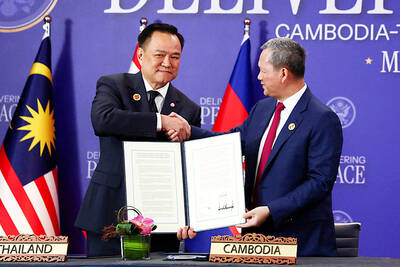Iran angrily blamed the US on Friday after at least three of its diplomats were wounded in a Baghdad shooting, saying the US was encouraging attacks on Iranians in Iraq.
The shooting — which may have been by Iraqi soldiers during an argument at a checkpoint — comes amid unprecedented strains between Iran and the Iraqi government, which has long been close to Tehran.
In recent weeks, Iranian officials have complained that Iraq’s Shiite-dominated leadership is bowing too much to Washington. The tensions have been fueled in part by Iraqi Prime Minister Nouri al-Maliki’s crackdowns in the past two months against Shiite militiamen that the US accuses Iran of backing, a claim Tehran denies.
The shooting occurred on Thursday as the Iranians’ convoy approached a bridge leading to a revered Shiite shrine in the northern Baghdad neighborhood of Kazimiyah.
An Iraqi Interior Ministry official said Iraqi soldiers at a checkpoint on the bridge exchanged fire with the convoy’s guards in an argument that broke out when most of the Iranians failed to produce identification cards.
Iranian Embassy spokesman Manoucher Taslimi said he did not know who the gunmen were. Taslimi said two Iranian diplomats, another Iranian and an Iraqi administrative employee were wounded and were now in stable condition.
The ministry official said five people were wounded.
Lieutenant David Russell, a US. military spokesman in Baghdad, said the Iraqi army had found four wounded Iranians in a vehicle with an Iraqi driver. The discrepancy in numbers could not immediately be reconciled.
In Tehran, Foreign Ministry spokesman Mohammad Ali Hosseini blasted the US, saying its harsh rhetoric against Iran fuels attacks on Iranians. US statements “encourage inhuman behavior by occupiers and terrorist groups active in Iraq,” he said.
“Responsibility for providing security to diplomats as well as diplomatic and international bodies in Iraq rests with the occupiers. The suspicious behavior of US forces in security issues has brought increasing insecurity in Iraq,” he said in a statement.
Hosseini said Iran will pursue the case with Iraqi government officials.

Shamans in Peru on Monday gathered for an annual New Year’s ritual where they made predictions for the year to come, including illness for US President Donald Trump and the downfall of Venezuelan President Nicolas Maduro. “The United States should prepare itself because Donald Trump will fall seriously ill,” Juan de Dios Garcia proclaimed as he gathered with other shamans on a beach in southern Lima, dressed in traditional Andean ponchos and headdresses, and sprinkling flowers on the sand. The shamans carried large posters of world leaders, over which they crossed swords and burned incense, some of which they stomped on. In this

‘NO COUNTRY BUMPKIN’: The judge rejected arguments that former prime minister Najib Razak was an unwitting victim, saying Najib took steps to protect his position Imprisoned former Malaysian prime minister Najib Razak was yesterday convicted, following a corruption trial tied to multibillion-dollar looting of the 1Malaysia Development Berhad (1MDB) state investment fund. The nation’s high court found Najib, 72, guilty on four counts of abuse of power and 21 charges of money laundering related to more than US$700 million channeled into his personal bank accounts from the 1MDB fund. Najib denied any wrongdoing, and maintained the funds were a political donation from Saudi Arabia and that he had been misled by rogue financiers led by businessman Low Taek Jho. Low, thought to be the scandal’s mastermind, remains

Near the entrance to the Panama Canal, a monument to China’s contributions to the interoceanic waterway was torn down on Saturday night by order of local authorities. The move comes as US President Donald Trump has made threats in the past few months to retake control of the canal, claiming Beijing has too much influence in its operations. In a surprising move that has been criticized by leaders in Panama and China, the mayor’s office of the locality of Arraijan ordered the demolition of the monument built in 2004 to symbolize friendship between the countries. The mayor’s office said in

FIGHTING CONTINUES: Thai military dropped 40 bombs on border areas, Cambodia said, while Bangkok said Phnom Penh launched heavy attacks and damaged homes Cambodia yesterday accused Thailand of intensifying its bombardment of disputed border areas, even as officials from the two countries attend a multi-day meeting aimed at negotiating an end to deadly clashes. The neighbors’ long-standing border conflict reignited this month, shattering an earlier truce and killing more than 40 people, according to official counts. About 1 million people have also been displaced. Cambodian and Thai officials were in their third day of talks at a border checkpoint, with ministers of defense from the two countries scheduled to meet today. However, the Cambodian Ministry of National Defense said Thailand’s military carried out a heavy